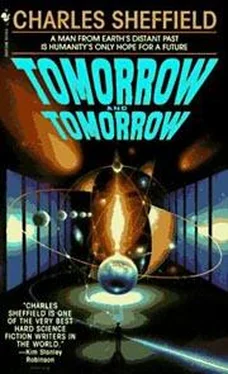after that it may start to get nasty.”
Just how could a planet or a space colony defend itself from outside attack? How could humans counterattack or make a preemptive defensive strike? How did one fight something unknown? Drake rummaged for long-buried ideas, things he had read when he was young and never expected to use or need. His mind was disturbingly well-stocked with them. So much for his pacifist self-image.
Until Ana went to the cryowomb and he was scrambling for money, he had resisted the idea of producing any form of professional description. He had been pretty snooty about it. What could words possibly say, he said to himself and to anyone else who would listen, about the ability to write interesting music?
Times changed. Now he could produce an intriguing resume: Drake Merlin; composer; performer; would-be pacifist; and Supreme Commander of Combined Galactic Forces. •
•
•The easiest part seemed to be the creation of a chain of command. He needed to worry about just the first level. Even so, he learned within minutes that he could only interface with a composite if it simulated an individual with whom he was familiar and comfortable. That narrowed the options enormously; especially since any kind of Ana simulation was out of the question.
First, though, he had to select a command headquarters. That wasn’t hard; he had returned to consciousness so often through the ages in the little villa overlooking the Bay of Naples and Tyrrhenian Sea, it was starting to feel like home. He fixed it in his mind, furnished for his own comfort.
Then it was time to define his principal assistants. Tom Lambert assured him that all he had to do was think of the person, and the composites would handle the rest. Tom didn’t say how, and Drake didn’t ask. He just set to work.
Tom, of course. And Milton. The Servitor had abandoned the original wheeled sphere and whisk broom of many billions of years ago, but it was the form most familiar to Drake. Milton might as well stay in that shape. Cass Leemu, who had tried to teach him science so long ago — and failed — would be his chief scientific adviser. And Melissa Bierly. He wondered about that choice, until she appeared at the table. She was not the woman he had last met, sane and contented and the lover and companion of the cloned Ana, but the mercurial and mad Melissa as she had been at her first creation. War was a form of insanity. Drake needed an element of madness. He could see it now, in those brilliant sapphire eyes.
Trismon Sorel and Ariel appeared briefly, but they would not hold their shapes. It was Drake’s own mind, rejecting them for its own reasons: either he did not know them well enough, or they did not fit his present needs.
He was not happy with the two who completed the half dozen. Par Leon had appeared first, as unwarlike as a human could be. Maybe that meant he was close in temperament to Drake, who needed him for that reason. But then there had to be a balance.
Drake called on someone he hated. Mel Bradley had been the scourge of his childhood; short, hyperactive, hotheaded, ready to fight over nothing. He had sneered at Drake, calling him a girl and a soft-head sissy who liked stupid poetry. In their one confrontation as eleven-year-olds, he had given Drake a black eye. After that Drake went out of his way to avoid him, without ever quite admitting that he was scared. Now Mel, adult and wary, glowered at Drake from the other end of the room.
Six assistants. He looked along the polished table and considered the result of his efforts. How much reality was there in any of this? The others had been created out of his own stored consciousness, plus the combined contents of the data banks. All of them (including Drake himself!) consisted of nothing more than a random movement of electrons. But hadn’t that always been true of thoughts in every brain, whether organic or inorganic, wetware or hardware?
And if Drake was not fully satisfied with his chosen assistants, hadn’t that always been true of all leaders? He remembered what the Duke of Wellington said, after he reviewed his own poorly trained and ill-equipped troops and before they went into battle: “I don’t know what effect these men will have upon the enemy, but by God they terrify me.”
Drake never expected to see the rest of his own “troops.” All instructions would go out, and all reports come in, through the chosen six. That might be a problem. Old wars had been plagued by officers who restricted access to their generals and told them only what they wanted to hear: “The fort is impregnable…” “The morale of the men remains excellent…” “Strategic bombing will weaken the enemy to the point where their resistance is impossible…” “The adversary’s losses far exceed our own…” “One more increase in troop strength will turn the tide in our favor.”
And the slaughter had rolled on.
Well, with luck, the composites would have forgotten how to lie. They should have no interest in telling Drake only what they thought might please him.
But in fact, none of this could ever please him. He told himself, over and over, why he was doing this: only in order that, someday, he and Ana could be together again.
The next task was to divide up the workload among his chosen helpers.
“You, Cass.” Drake wondered how long it would be before giving orders came easily to him. At the moment he hated it. “I want you to produce the science and technology summary for me. I have to know what’s available now, because that’s going to be the basis for our weapons development. Milton, you will be the expert on alien life-forms, anywhere in the Galaxy. Par Leon, I want you to learn exactly which stars have been affected by the Shiva, and tell me which ones are now in most danger. Mel, you are in charge of offense. That means you’ll be planning counterattacks. You ought to love that. Melissa, you’ll be my expert on the Shiva themselves — everything that humans know, I want to know. Tom, as my general support, you are to remain flexible, ready to tackle anything that comes up.
“Any questions?”
“Yes.” It was Melissa. Her reply stopped Drake cold. It seemed to him he had been perfectly clear and he wasn’t expecting questions. He frowned at her. “What’s the problem?”
“I’m confused. It seems to me that my task is already finished.”
“You have a report on the Shiva?” Even with the uncanny computing speed of the composites, that seemed impossible.
“In a manner of speaking. And so do you. We know all there is to be known.”
She didn’t sound confused. She sounded sure of herself, the confident, competent, all-seeing Melissa that Drake had known of old. He groaned inwardly. They had hardly begun, and already he sensed trouble.
Melissa was right. Her briefing took many minutes, but the main conclusion could be summarized in seconds.
One stellar system, far out beyond the main galactic rim, had ceased to communicate with all other humans thirty-three million years earlier. That was the first. The change had been noted, but it drew no attention. Composites and civilizations often chose to go their own ways, even as Earth had gone its own way and withdrawn from the solar system back in what was now considered the dawn of history.
Over the next several thousand years, half a dozen more systems fell silent. They were in the same remote galactic region as the first one. Still, no one was worried. They were presumed to be part of the same social experiment.
A hundred, a thousand, ten thousand; not until a hundred thousand colonies were silent did humanity sit up and take notice. Before any action was taken, the number had grown to over a million.
Even then, the superluminal S-wave queries suggested more curiosity than worry. They were polite requests for a reply: “ Are you all right? Is there anything that we can do for you?”
Читать дальше












